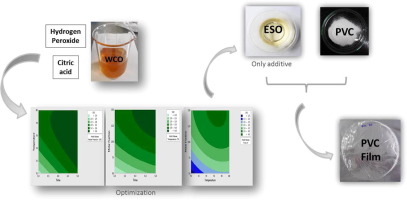当前位置:
X-MOL 学术
›
Eur. Polym. J.
›
论文详情
Our official English website, www.x-mol.net, welcomes your
feedback! (Note: you will need to create a separate account there.)
Sustainable Synthesis of Epoxidized Waste Cooking Oil and Its Application as a Plasticizer for Polyvinyl Chloride Films
European Polymer Journal ( IF 5.8 ) Pub Date : 2018-02-01 , DOI: 10.1016/j.eurpolymj.2017.12.014 Andreia H. Suzuki , Bruno G. Botelho , Leandro S. Oliveira , Adriana S. Franca
European Polymer Journal ( IF 5.8 ) Pub Date : 2018-02-01 , DOI: 10.1016/j.eurpolymj.2017.12.014 Andreia H. Suzuki , Bruno G. Botelho , Leandro S. Oliveira , Adriana S. Franca

|
Abstract For the past decade, environmentally friendly features have been one of the most desired characteristics of most of the arising technologies. The search for materials from renewable sources and the development of novel non-hazardous processes for their production is currently of the utmost relevance. However, significant improvements on the current technologies towards greener less energy-demanding processes are as important as the search for new ones, and sometimes improvements are more easily achievable and more readily applicable. In this work, the feasibility of using waste cooking oil as a feedstock for the production of epoxidized vegetable oil resins in a process devoid of catalyst has been demonstrated. The epoxidation process was carried out using citric acid as the only acidic component, generating no solid residues and a liquid residue less toxic than the one from the conventional processes. The produced epoxidized waste vegetable oil was successfully applied as a primary plasticizer in poly(vinyl chloride) (PVC) films. The produced films showed mechanical and thermal properties matching those of commercial stretch PVC films.
中文翻译:

环氧化废食用油的可持续合成及其作为聚氯乙烯薄膜增塑剂的应用
摘要 在过去的十年中,环保特性一直是大多数新兴技术最需要的特性之一。从可再生资源中寻找材料并开发新的无害生产工艺是目前最重要的。然而,对当前技术进行重大改进,以实现更环保、能源需求更低的过程与寻找新的过程同样重要,有时改进更容易实现且更容易应用。在这项工作中,证明了使用废食用油作为原料在没有催化剂的情况下生产环氧化植物油树脂的可行性。使用柠檬酸作为唯一的酸性组分进行环氧化过程,不会产生固体残留物,液体残留物的毒性比传统工艺低。生产的环氧化废植物油成功地用作聚(氯乙烯)(PVC)薄膜的主要增塑剂。生产的薄膜显示出与商业拉伸 PVC 薄膜相匹配的机械和热性能。
更新日期:2018-02-01
中文翻译:

环氧化废食用油的可持续合成及其作为聚氯乙烯薄膜增塑剂的应用
摘要 在过去的十年中,环保特性一直是大多数新兴技术最需要的特性之一。从可再生资源中寻找材料并开发新的无害生产工艺是目前最重要的。然而,对当前技术进行重大改进,以实现更环保、能源需求更低的过程与寻找新的过程同样重要,有时改进更容易实现且更容易应用。在这项工作中,证明了使用废食用油作为原料在没有催化剂的情况下生产环氧化植物油树脂的可行性。使用柠檬酸作为唯一的酸性组分进行环氧化过程,不会产生固体残留物,液体残留物的毒性比传统工艺低。生产的环氧化废植物油成功地用作聚(氯乙烯)(PVC)薄膜的主要增塑剂。生产的薄膜显示出与商业拉伸 PVC 薄膜相匹配的机械和热性能。











































 京公网安备 11010802027423号
京公网安备 11010802027423号